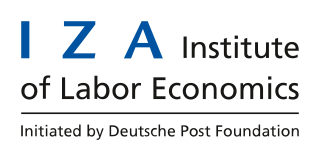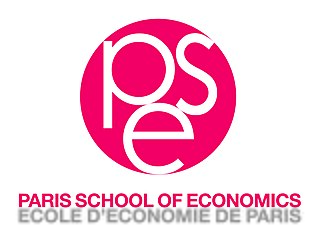Related Research Articles
Energy economics is a broad scientific subject area which includes topics related to supply and use of energy in societies. Considering the cost of energy services and associated value gives economic meaning to the efficiency at which energy can be produced. Energy services can be defined as functions that generate and provide energy to the “desired end services or states”. The efficiency of energy services is dependent on the engineered technology used to produce and supply energy. The goal is to minimise energy input required to produce the energy service, such as lighting (lumens), heating (temperature) and fuel. The main sectors considered in energy economics are transportation and building, although it is relevant to a broad scale of human activities, including households and businesses at a microeconomic level and resource management and environmental impacts at a macroeconomic level.
The Economic and Social Research Institute is an Irish research institute founded in 1960 to provide evidence-based research used to inform public policy debate and decision-making. The research of the institute focuses on the areas of sustainable economic growth and social progress. Alan Barrett is the Director of the institute.
Research Papers in Economics (RePEc) is a collaborative effort of hundreds of volunteers in many countries to enhance the dissemination of research in economics. The heart of the project is a decentralized database of working papers, preprints, journal articles, and software components. The project started in 1997. Its precursor NetEc dates back to 1993.

The IZA - Institute of Labor Economics, until 2016 referred to as the Institute for the Study of Labor (IZA), is a private, independent economic research institute and academic network focused on the analysis of global labor markets and headquartered in Bonn, Germany.

The United Nations University - Maastricht Economic and Social Research Institute on Innovation and Technology (UNU-MERIT) is a joint research and training institute of the United Nations University and Maastricht University, with both parent institutions supplying staff. UNU-MERIT is based in Maastricht, in the southeastern part of the Netherlands.

The Paris School of Economics is a French research institute in the field of economics. It offers MPhil, MSc, and PhD level programmes in various fields of theoretical and applied economics, including macroeconomics, econometrics, political economy and international economics.

The Barcelona School of Economics (BSE) is an internationally renowned institute for research and graduate education in economics, finance, data science, and the social sciences located in Barcelona, Spain.
The Tinbergen Institute is a joint institute for research and education in economics, econometrics and finance of the VU University Amsterdam, the University of Amsterdam, and the Erasmus University Rotterdam. The institute was founded in 1987 and is named after the Dutch economist Jan Tinbergen, a Nobel prize-winning professor at the Erasmus University Rotterdam.

Lahore School of Economics, also known as "The Lahore School", is a private research university based in Lahore, Punjab, Pakistan and recognized by the Higher Education Commission of Pakistan. It was established in 1993 and chartered by the Government of the Punjab four years later in 1997 through the Lahore School of Economics Act.

The ZEW - Leibniz Centre for European Economic Research in Mannheim is an economic research institute in the Gottfried Wilhelm Leibniz Science Association (WGL). It is headed by President Achim Wambach and Commercial Director Thomas Kohl. According to the RePEc ranking, ZEW is one of the leading European economic research institutes. Currently, ZEW has 188 employees, 116 of whom are scientists.
Almas Heshmati is a Swedish-Iranian economist. Currently, he is professor of economics at Sogang University and Jönköping International Business School. He is a member of IZA, the Bonn-based Institute for the Study of Labour.

The Centre for Economic Performance (CEP) is an interdisciplinary research centre at the London School of Economics dedicated to the study of economic growth and effective ways to create a fair, inclusive and sustainable society. Currently led by Prof. Stephen Machin, it is one of the world's most prestigious economic research institutes, being the most important economic research institute in the United Kingdom, jointly with the Centre for Economic Policy Research. Its research performance has been particularly strong in the research areas of labour economics, productivity, happiness economics, human capital, the knowledge economy, ICT, innovation, education, and European microeconomic issues.

Klaus Felix Zimmermann is a German economist and emeritus professor of economics at Bonn University. Additionally, he is an honorary professor at Maastricht University, the Free University of Berlin and the Renmin University of China as well as president of the Global Labor Organization. His research interests include population, labour, development and migration, with Zimmermann being among the leading economists on the topic of migration.
Eliana La Ferrara is an Italian economist and Professor of Public Policy at Harvard University's Kennedy School of Government. Before receiving tenure at Harvard in 2022, she held the Fondazione Romeo ed Enrica Invernizzi Chair in Development Economics at Bocconi University, where she also acted as Scientific Director of the Laboratory for Effective Anti-poverty Programs (LEAP). Previously, she was also the president of the Bureau for Research and Economic Analysis of Development (BREAD) as well as the president of the European Economic Association. In terms of research, her fields of interest include development economics, political economy, and public economics.
Christian Dustmann, FBA, is a German economist who currently serves as Professor of Economics at the Department of Economics of University College London. There, he also works as Director of the Centre for Research and Analysis of Migration (CReAM), which he helped found. Dustmann belongs to the world's foremost labour economists and migration scholars.

Pierre Cahuc is a French economist who currently works as Professor of Economics at Sciences Po. He is Program Director for the IZA Institute of Labor Economics's programme "Labour Markets" and research fellow at CEPR. His research focuses mainly on labour economics and its relationship with macroeconomics. In 2001, he was awarded the Prize of the Best Young Economist of France for his contributions to economic research. He belongs to the most highly cited economists in France and Europe's leading labour economists.
Yuriy Gorodnichenko is an economist and Quantedge Presidential professor at the University of California, Berkeley.
Arthur J. Robson is a New Zealand economist whose research interests include game theory and the biological evolution of economic behaviour. In the period between 2003 and 2017, Robson held a Canada Research Chair in Economic Theory and Evolution at Simon Fraser University, where he has been a University Professor since 2017.
Petia Topalova is the Deputy Chief in the Emerging Economies Unit of the European Department of the International Monetary Fund and Mission Chief for the Slovak Republic. She is also a research economist with publications in development and trade economics.
Nicolas Robert Ziebarth is a university professor at the University of Mannheim and the ZEW- the Leibniz Centre for European Economic Research. Since 2022, he is head of their Research Unit "Labour Markets and Social Insurance." Since its founding in 2021, he served as a tenured Associate Professor in Cornell's Brooks School of Public Policy and the Department of Economics. Prior to that, he was an Assistant Professor (2011-2017) and then tenured Associate Professor (2017-2021) in Cornell's Department of Policy Analysis and Management.
References
- ↑
- ↑
- ↑
- ↑ CELSI: People
- ↑
- ↑ CELSI: About Us,
- ↑ CELSI: Publications Archived September 18, 2013, at the Wayback Machine
- ↑ CELSI: Main Research Areas,
- ↑ CELSI: Discussion Papers Archived December 16, 2012, at the Wayback Machine ,
- ↑ CELSI: Research Reports,
- ↑ CELSI: Policy Briefs,
- ↑ "Economics rankings: Think Tanks | IDEAS/RePEc". ideas.repec.org. Retrieved 2024-02-29.
- ↑ "Within Country and State Economics Rankings: Slovakia | IDEAS/RePEc". ideas.repec.org. Retrieved 2024-02-29.
- ↑ RePEc: Top Institutions Globally, as of March 2020,
- ↑ "Martin Kahanec". Celsi.sk. Retrieved 2024-02-29.